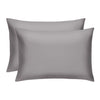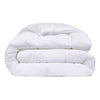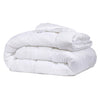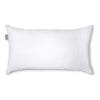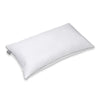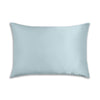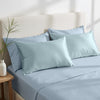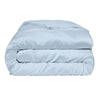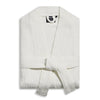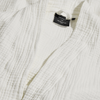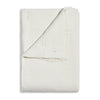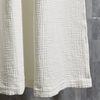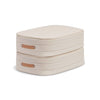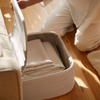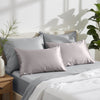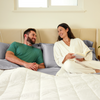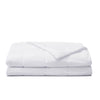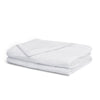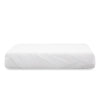The Daily Miracle
What Is a Good Sheet Thread Count?
Published
February 02, 2021
Author
Nicholas Crusie

Shopping for sheets, especially online, can be a little bit overwhelming. There are so many varieties out there that mention specifics like thread count, material, weave, etc. But what does all of this mean and how can you figure out which factors really matter when you’re looking for soft and quality sheets? Thankfully, we are here to tell you everything you need to know about thread count for sheets in addition to other factors you need to take into consideration while shopping for sheets.
What Does “Thread Count” Refer to?
At the most basic level, thread count refers to the number of threads in one square inch of fabric. Threads are crossed over each other vertically and horizontally to form the weave of the fabric. Generally speaking, the range of thread counts for sheets is between 180 to over 1,000 fibers per square inch of material. Obviously, this is a big range, but what does it actually mean in practice when you’re looking to buy some soft sheets?
Does Thread Count Really Matter?
As it turns out, thread count doesn’t really mean as much as you think it does! A lot of people are totally stuck on the idea of thread count determining how soft or high-quality a sheet is. Therefore, they spend way more money than they really need to on high thread count sheets that probably aren’t too different from lower-count alternatives. But how does this happen? Well, manufacturers are able to kind of manipulate the whole thread count system. They can do this by using really really thin fibers that aren’t necessarily high-quality. When you use thin fibers, you can therefore fit more fibers into a square inch of space -- thereby increasing the thread count. Another way they can do this is to use multi-ply threads by twisting two, three, or four threads together before weaving it into the fabric. Since there are more threads within a single strand, they can claim that the thread count is higher since they are essentially maximizing the number of threads in one area. That being said, this method doesn’t really translate into softer or stronger sheets -- so basically it’s a pointless method that’s usually just done to trick consumers into thinking that their products are better than they really are.
What Is a Good Sheet Thread Count?
If thread count isn’t that important, then what thread counts should you be on the lookout for? We would say that you should definitely avoid super low thread count sheets that fall between 180 to 300 threads per square inch. These types of sheets won’t be very soft and might even be scratchy on your skin! This obviously isn’t what you want. We would also say that you don’t really need to buy sheets with a thread count that is higher than 500-600. After your sheets hit this number, the ratio of softness vs. price doesn’t match up. This means that you could end up spending a lot more for 1,000 thread count sheets that really aren’t that much softer or better than 500 thread count sheets! For this reason, we find that the “sweet spot” of thread counts falls between 350 and 500 threads per square inch. That’s why we love the Miracle Brand’s sheet sets that come in both 350 and 500 thread count varieties for sheets that are super soft yet still affordable!
What Is a Good Sheet Material?
When it comes to different materials for sheets, some are definitely better than others. That being said, some people might prefer certain materials while others prefer different materials. This is fine and understandable since we are all different and live in different places. In any case, here’s a quick description of some of the best materials for sheets as well as the pros and cons of each one:
- Cotton: Cotton is the best and most popular material for sheets due to the fact that it is soft and breathable while also being durable and affordable. If you want cotton sheets, look for long-stem cotton since it is more luxurious than its shorter-stem counterparts. We personally love Supima cotton, as it is grown in the US with a very long stem.
- Silk: Silk is actually produced by insects and has a very cool and almost slippery feel to it. These sheets can feel quite luxurious and are super cool to the touch. Silk is also hypoallergenic -- making it a great option for people who struggle with allergies.
- Polyester: Rather than being a natural fiber like cotton or silk, polyester is a man-made material that is used to cheaply manufacture all sorts of products. It’s cheaper because it is man-made. This means that it may not feel as soft as cotton or other natural materials.
Does Weave Play a Role?
Thread count and material are aspects of sheets that you’re probably already aware of -- but do you know about the importance of weave? These days, weave might be more important than thread count really is. But what does weave refer to in sheets? The weave of a sheet refers to how the different threads are weaved together to actually form the fabric itself. Many people assume that there’s only one way to weave a sheet together -- one thread on top, one on the bottom...repeat. However, there’s really more to it than that.
And that’s not to say that that type of weave doesn’t exist! It does, and it’s considered the basic weave that results in sheets that have a pretty low thread count, are pretty cheap, and aren’t that soft. On the other hand, there are more advanced and beneficial weaves to choose from like percale and sateen. A percale weave involves the same basic weaving process, but with a few changes made to create a higher quality product. In a percale weave, the cotton threads are combed and woven together tightly to create a sheet that is strong and durable with a nice crisp feeling. A sateen weave involves more threads going in one direction and less in the other. This type of weave leads to sheets that are super soft, silky, smooth, and cool. This is a great option if you love super-smooth sheets but don’t need the extra durability offered by a percale weave.
How to Find Sheets With the Best Thread Count
Finding sheets with the best thread count can be difficult. This is especially true if you’re shopping online and you can’t physically feel the sheets before you buy them. That’s why Miracle Brand offers a 30-night satisfaction guarantee with their sheets -- including both the 350-thread count Signature Set and the 500-thread count Extra Luxe Set. More than that, they also offer a five-year quality warranty that will replace any products that don’t stand the test of time!
Plus, sheets made by Miracle Brand are also spun with silver fibers that have antibacterial properties. This means that your sheets are then able to kill 99.9% of bacteria in your bedding that comes from sweat, body oils, skin products, dirt, etc. So not only are they super soft -- but they are super clean as well.
Conclusion
As you can see, a good sheet thread count falls between 300 and 500. And even though thread count is important, it’s just one piece of the puzzle when it comes to finding good sheets. You also need to consider the material of the sheets as well as the weave in order to find the best sheets around.
Did you know?
Silk is hypoallergenic. It’s a great option for people who struggle with allergies.
Sources:
- https://www.businessinsider.com/thread-count-meaning-bed-sheets-cotton-cloth-2017-11#:~:text=It%20refers%20to%20the%20number,ways%20of%20manipulating%20that%20number
- https://www.thespruce.com/bed-sheet-terms-thread-count-weave-and-fabric-350479
- https://www.businessinsider.com/bed-how-often-should-wash-sheets-dust-mites-fungi-bacteria-2019-5#:~:text=Each%20night%2C%20your%20body%20sheds,dust%20mites%20and%20their%20feces


